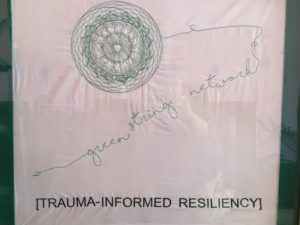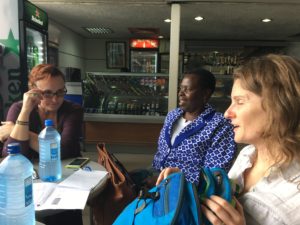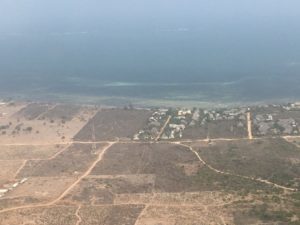Flying high over scattered clouds out toward the coast from Nairobi to Malindi, over mostly brittle brown lands bearing witness to the drought that has been visiting Kenya for some time. The dryness of the land stands in stark contrast to the living waters that flowed through our gatherings earlier today at the Green String Network office and the nearby Wasp and Sprout Café.
 About 15 women and 4 men gathered together to share introductions and establish the context for our conversations. After Tecla welcomed everyone, she invited me to offer a centering moment, which I gladly did. Then Angi gave an overview of GSN’s work, with a particular focus on creating a network of partners working on trauma healing as an essential foundation for peacebuilding and economic development.
About 15 women and 4 men gathered together to share introductions and establish the context for our conversations. After Tecla welcomed everyone, she invited me to offer a centering moment, which I gladly did. Then Angi gave an overview of GSN’s work, with a particular focus on creating a network of partners working on trauma healing as an essential foundation for peacebuilding and economic development.
They then invited Amy to speak about CFP’s work and our hopes for this gathering. Amy did a magnificent job providing an overview of CFP’s work in Sierra Leone, focused in local communities and guided by the belief that the answers and needed resources were already there. She spoke of the emergence of the powerful and transformative leadership of women through the creation of Peace Mother groups, and of CFP’s interest in growing women’s leadership in peacebuilding and development. She then expressed the hope that this would be a space where women could speak openly and confidently about their work and experience as women.
I then spoke briefly, beginning by acknowledging Rev. Phyllis Byrd-Ocholi, who I met nearly twenty years ago on my first visit to Nairobi for the infant URI. I thanked Phyllis for what she taught me in our brief time together, saying that, most likely without her having any awareness of it, she contributed significantly to the founding of URI. I noted that this was true for all of us. While we may be aware of some of the results of our presence in the world, there is so much we will never be aware of. I expressed my conviction that the leadership of women is essential for a positive future for humanity and my commitment to do everything I’m able to support that leadership.
Each of the other three men – John, Amin and Ratnash – spoke briefly about their intention to support women. Then we adjourned to the café to have our conversation about how men might best support women’s leadership. Once we were settled into a couple of cushion-covered rattan sofas under a large shade umbrella, we shared the stories of how we had arrived at this place at this moment. I was captivated by each of my colleagues’ sharing – stories that revealed a depth of reflection, sensitivity, commitment, spiritual grounding, competence and focus on service that both inspired and humbled me. Clearly, as one of them noted, Angi has gathered a remarkable team to support GSN’s work.
A couple of highlights for me: Each in their own way, my colleagues described a path into the work they have devoted their lives to that ran counter to family, and perhaps cultural, expectations. But they chose to follow the guidance of an inner voice, even if it meant being, in some sense, an outsider. One moving moment spoke to the inexpressible suffering male dominance has visited on people all over the Earth. During a trauma healing experience with Syrians from Allepo, a refugee shared, “We have cried so much, we have no more tears to cry. If a child died, we buried the child if we were able and moved on.”
Another shared his experience being involved in a women’s “Take Back The Night” event. About 100 women and 20 men participated, though only the women marched, with the men waiting to welcome them back to the rallying point. He said he could hear the power in the women’s voices as they marched nearby. Then, as they approached the men, the power in their voices diminished, as if being in the presence of men somehow robbed the women of their power.
In their own ways, each of my colleagues spoke of how they’d witnessed the positive contributions women’s leadership offers to peacebuilding, and the ways that leadership is ignored and/or dismissed by men. And they spoke of their commitment to supporting women’s leadership, which led us to an exploration of how best to support the emergence of strong women’s leadership.
They asked me what had helped that happen in Sierra Leone. I noted that, for a decade, Fambul Tok has had as a core value the equal participation of women and men. I also noted that after a decade it is still a struggle to honor that value because, since most societal measures of leadership have been shaped by men and women have been excluded from formal leadership for so long, most traditional and publicly acknowledged positions of leadership are held by men.
This means, I noted, that we need to be open to new, non-traditional understandings of leadership that will value the leadership women have always offered. At the same time, we need to continue to open more possibilities for women to step into traditional and/or societally acknowledged positions of leadership. These changes will substantially expand the pool of potential women leaders, opening the door for their inclusion in larger and larger numbers.
Also, it is important to examine traditional gender roles, opening space for women in professional and traditional leadership, and encouraging men to embrace roles in the home that have been held traditionally as “women’s” roles. And, it’s important to be open to the transformation of families and communities as women become essentially involved in important conversations and decision-making about their communities, and as feminine values are more widely embraced by women and men.
 It seemed our conversation was just warming up when we were informed the women were finished and were having snacks; and Amy, Tecla, Angi, Nyambura and I would need to leave fairly soon to catch our flight to Malindi on the coast. So, we thanked each other for an enlightening and inspiring conversation and returned to the office, which was filled with the energy of deep and powerful connection among the women. As I spoke with them about how the conversation had gone, Amy, Tecla, Angi and Nyambura each affirmed that it had been a transformative time of women sharing deeply, often painfully, and always hopefully from their experiences; and with a clear desire to continue the conversation.
It seemed our conversation was just warming up when we were informed the women were finished and were having snacks; and Amy, Tecla, Angi, Nyambura and I would need to leave fairly soon to catch our flight to Malindi on the coast. So, we thanked each other for an enlightening and inspiring conversation and returned to the office, which was filled with the energy of deep and powerful connection among the women. As I spoke with them about how the conversation had gone, Amy, Tecla, Angi and Nyambura each affirmed that it had been a transformative time of women sharing deeply, often painfully, and always hopefully from their experiences; and with a clear desire to continue the conversation.
Amy’s initial questions that framed the conversation for the women were: What do you most appreciate about yourself that contributes to peacebuilding? What aspects of yourself are not seen and appreciated that you feel could contribute positively to peacebuilding? She offered her sense that the conversation had created a powerful opening for many of the women to have a new sense of themselves specifically as women peacebuilders. At the end, Amy offered her second set of questions for ongoing reflection and sharing: What is your prayer request for yourself as a peacebuilder? What do you hope to see that will support growing women’s leadership? On the way to the airport, the GSN women were already discussing how to build on the momentum for connection and mutual support and cooperative action that had emerged.

As I finish this, night has fallen at our seaside Airbnb outside of Malendi where we’ve had a few hours of relaxed reflection on the day and anticipation of an engaging meeting tomorrow with women leaders from Malindi.

